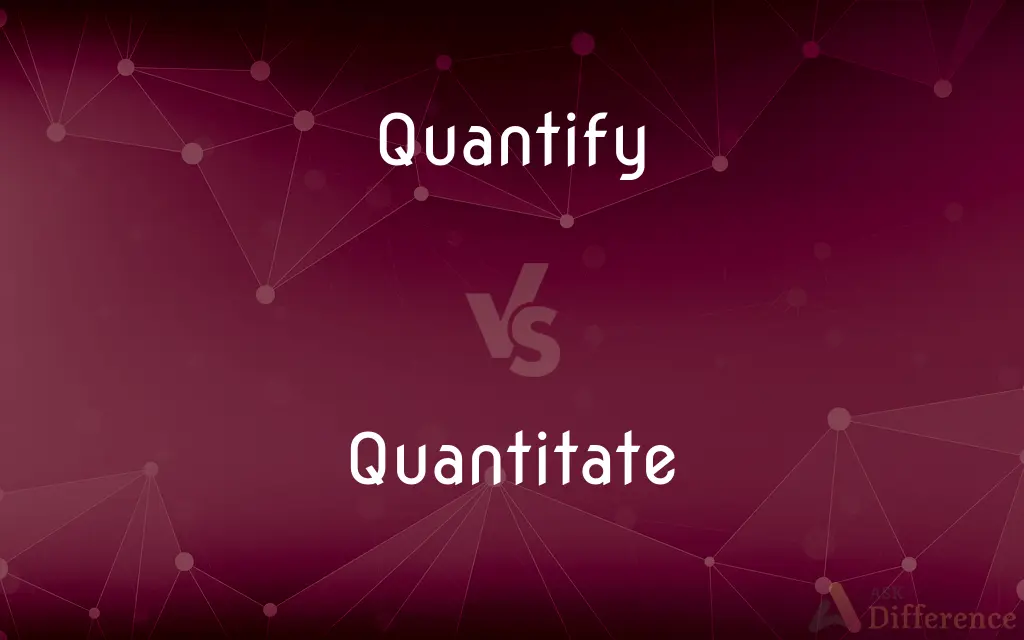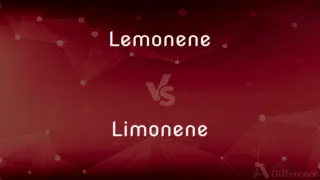Quantify vs. Quantitate — What's the Difference?
By Fiza Rafique & Urooj Arif — Updated on February 23, 2024
Quantify means to measure or express the quantity of something, often using numbers or units, while quantitate is a less common term that refers to determining or expressing the quantity of something in quantitative terms, often used in science.

Difference Between Quantify and Quantitate
Table of Contents
ADVERTISEMENT
Key Differences
Quantify is a widely used term across various fields, including mathematics, science, finance, and everyday language. It involves expressing the amount, number, or extent of something in measurable terms, making abstract concepts more concrete and understandable. For example, quantifying the success of a project might involve metrics like profit, user engagement, or productivity increases.
Quantitate, while similar in meaning to quantify, is less frequently used and more often found in scientific or technical research, particularly in chemistry and biology. It refers to the process of determining the quantity of a substance or the concentration of elements within a mixture. Quantitation is about measuring and expressing the amount of a specific component in precise terms, often requiring specialized equipment and methodologies, such as spectrophotometry in a laboratory setting.
The main difference between the two lies in their usage and context. Quantify is a broader term applicable in numerous contexts where measuring or expressing quantities is necessary. Quantitate, on the other hand, is a more specialized term that implies a scientific process of measuring specific quantities, often with a high degree of precision and within a particular field of study.
Understanding when to use each term depends on the context and the precision required in expressing quantities. While "quantify" is suitable for general use and in contexts where precision is less critical, "quantitate" is reserved for scientific discussions where the method and precision of measurement are of paramount importance.
Comparison Chart
Definition
Measure or express the quantity of something in numerical terms.
Determine or express the quantity of a specific component in precise terms.
ADVERTISEMENT
Usage
Broad, applicable in various fields and everyday language.
Specialized, primarily used in scientific and technical research.
Context
General measurement, finance, business, etc.
Scientific research, particularly in chemistry and biology.
Precision
Can vary, from approximate to precise measurements.
Typically requires high precision and specific methodologies.
Examples
Quantifying economic growth, user engagement, etc.
Quantitating the concentration of a substance in a sample.
Compare with Definitions
Quantify
To express or measure something in numerical terms.
The study quantified the impact of diet on health.
Quantitate
To measure the quantity of a specific component precisely.
Scientists quantitate DNA concentration using gel electrophoresis.
Quantify
Broad application, from business metrics to scientific data.
Economists quantify inflation rates using price indices.
Quantitate
Implies a high degree of precision and accuracy.
Biologists quantitate enzyme activity in reaction assays.
Quantify
Can involve both precise and approximate measurements.
Surveys quantify customer satisfaction on a scale of 1 to 10.
Quantitate
Specific to the field of study, especially in life sciences.
The study involved quantitating neurotransmitter levels in the brain.
Quantify
Used in various contexts to indicate the amount or extent.
Managers aim to quantify productivity gains from new software.
Quantitate
Often used in laboratory settings with specialized equipment.
Chemists quantitate trace elements in water samples via spectrometry.
Quantify
Makes abstract concepts tangible by assigning numerical values.
Researchers quantify environmental damage in monetary terms.
Quantitate
Associated with quantitative analysis in research.
The lab used chromatography to quantitate the compounds in the extract.
Quantify
To determine or express the quantity of.
Quantitate
To determine or measure the quantity of.
Quantify
To determine the value of (a variable or expression).
Quantitate
(transitive) To measure the quantity of, especially with high accuracy and taking uncertainty into account, as in quantitative analysis.
Quantify
To modify or qualify with respect to quantity; to determine, fix or express the quantity of; to rate.
Quantify
To make explicit the quantity of; as, to quantify a variable.
Quantify
Express as a number or measure or quantity;
Can you quantify your results?
Common Curiosities
Is "quantitate" just a more formal way to say "quantify"?
Not exactly. While similar, "quantitate" is more specialized and often used in scientific contexts to denote precise measurement.
Why is "quantitate" less common than "quantify"?
"Quantitate" is a technical term specific to certain scientific fields, making it less applicable in general contexts.
Do I need special tools to quantitate?
In scientific contexts, yes. Quantitation often involves specialized equipment like spectrophotometers or chromatography systems.
How does technology affect the ability to quantify or quantitate?
Advances in technology enhance precision and ease of both quantifying and quantitating, allowing for more accurate and efficient measurements.
Can social sciences use quantitation?
While less common, social sciences can use quantitation methods, especially in areas intersecting with biology or when precise measurements are needed.
Can I use "quantify" in a scientific research paper?
Yes, "quantify" is acceptable and commonly used in research to describe measuring or expressing quantities.
Is there a trend toward more quantitation in research?
Yes, as methodologies improve and data becomes more central to scientific inquiry, there's a trend toward more precise quantitation in research.
Can qualitative data be quantified or quantitated?
Qualitative data can be quantified (converted into numerical form) for analysis, but "quantitate" typically applies to inherently quantitative data.
Can "quantitate" apply to non-scientific measurements?
It's primarily used in scientific contexts; in non-scientific contexts, "quantify" is generally the preferred term.
What's the learning curve like for quantitation techniques?
It can be steep, as quantitation in scientific contexts often requires understanding complex methodologies and operating specialized equipment.
Is quantitation always more accurate than quantification?
In the context of scientific research, quantitation implies a high degree of precision, whereas quantification can vary in accuracy.
Are there software tools that can assist with quantitation?
Yes, various software tools are designed to analyze data from scientific instruments, aiding in the quantitation process.
Can "quantify" and "quantitate" be used interchangeably in academic writing?
While they can sometimes be used interchangeably, it's important to choose the term that accurately reflects the precision and context of the measurement.
How do cultural differences impact the use of "quantify" vs. "quantitate"?
Cultural differences might not directly impact the use of these terms, but disciplinary norms within academic and professional communities can influence preference.
How do novice researchers learn to quantitate effectively?
Through education, mentorship, and hands-on experience in their specific fields, often involving learning to use and interpret data from specific instruments and techniques.
Share Your Discovery

Previous Comparison
Lemonene vs. Limonene
Next Comparison
Tote vs. SatchelAuthor Spotlight
Written by
Fiza RafiqueFiza Rafique is a skilled content writer at AskDifference.com, where she meticulously refines and enhances written pieces. Drawing from her vast editorial expertise, Fiza ensures clarity, accuracy, and precision in every article. Passionate about language, she continually seeks to elevate the quality of content for readers worldwide.
Co-written by
Urooj ArifUrooj is a skilled content writer at Ask Difference, known for her exceptional ability to simplify complex topics into engaging and informative content. With a passion for research and a flair for clear, concise writing, she consistently delivers articles that resonate with our diverse audience.















































